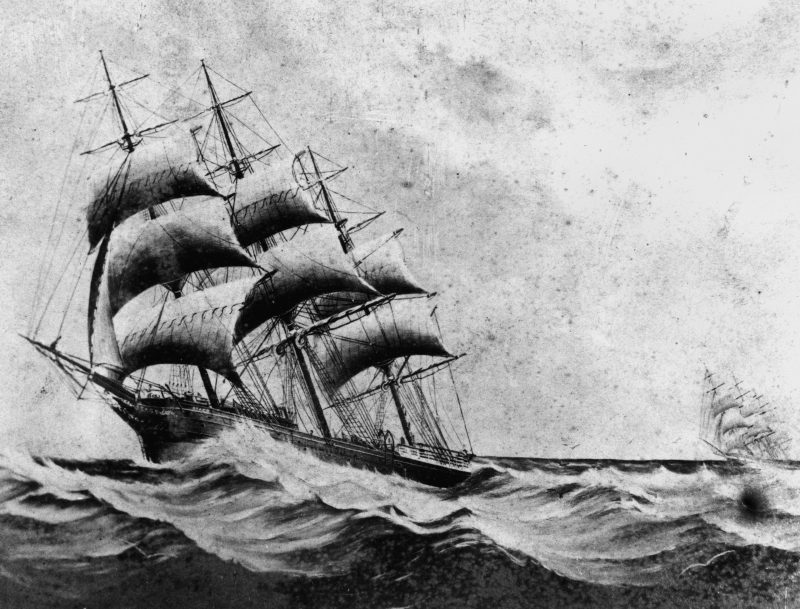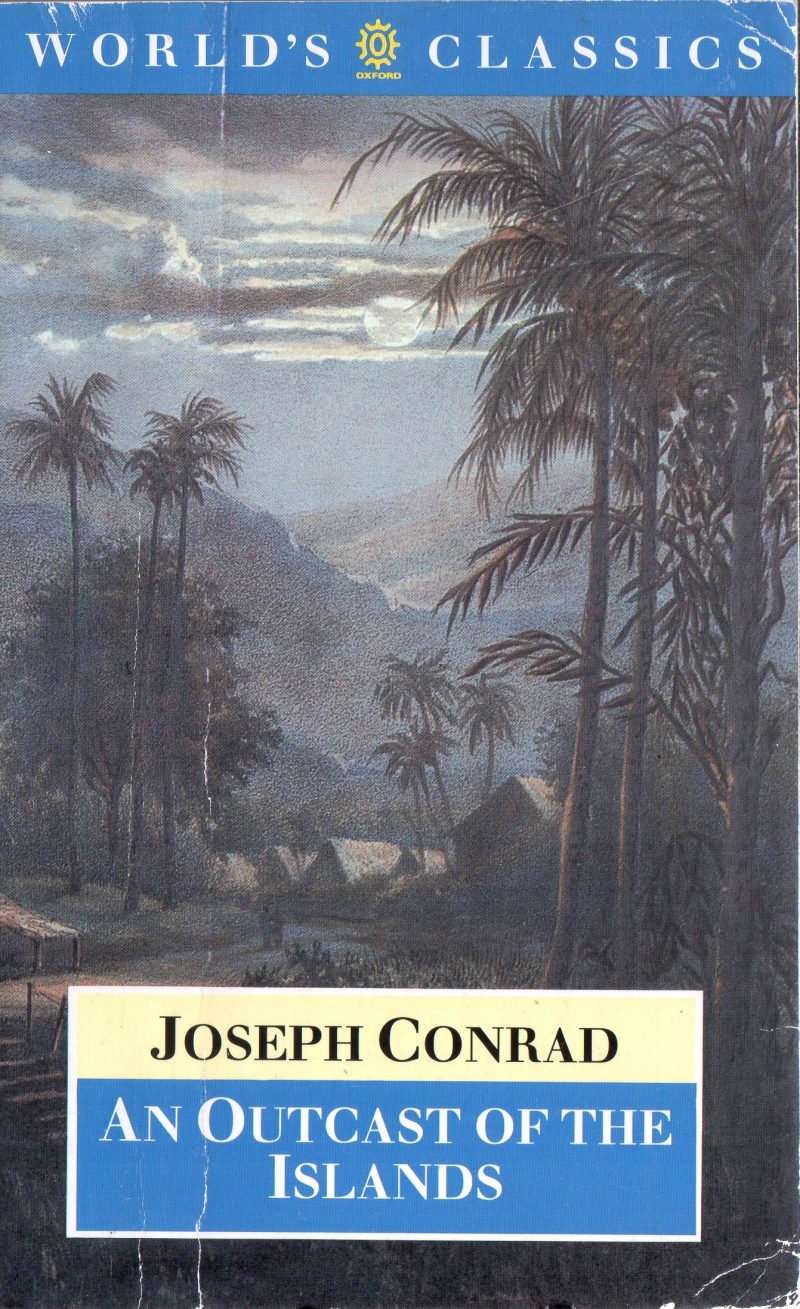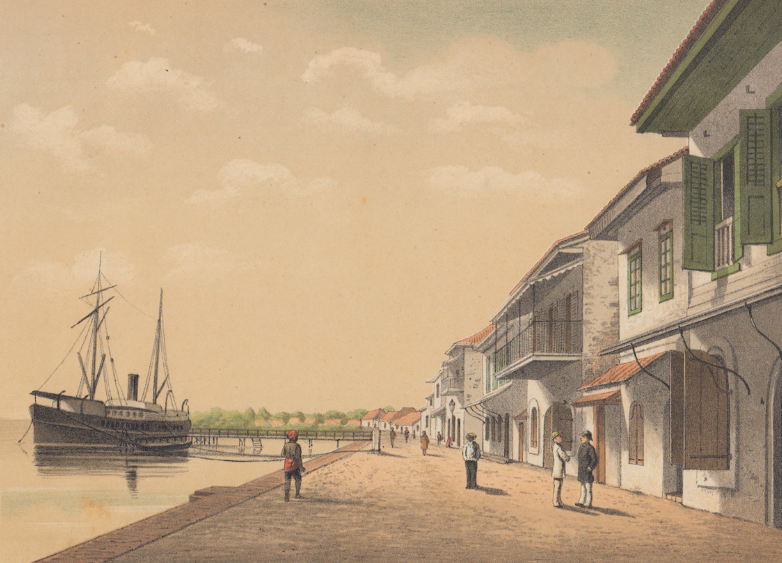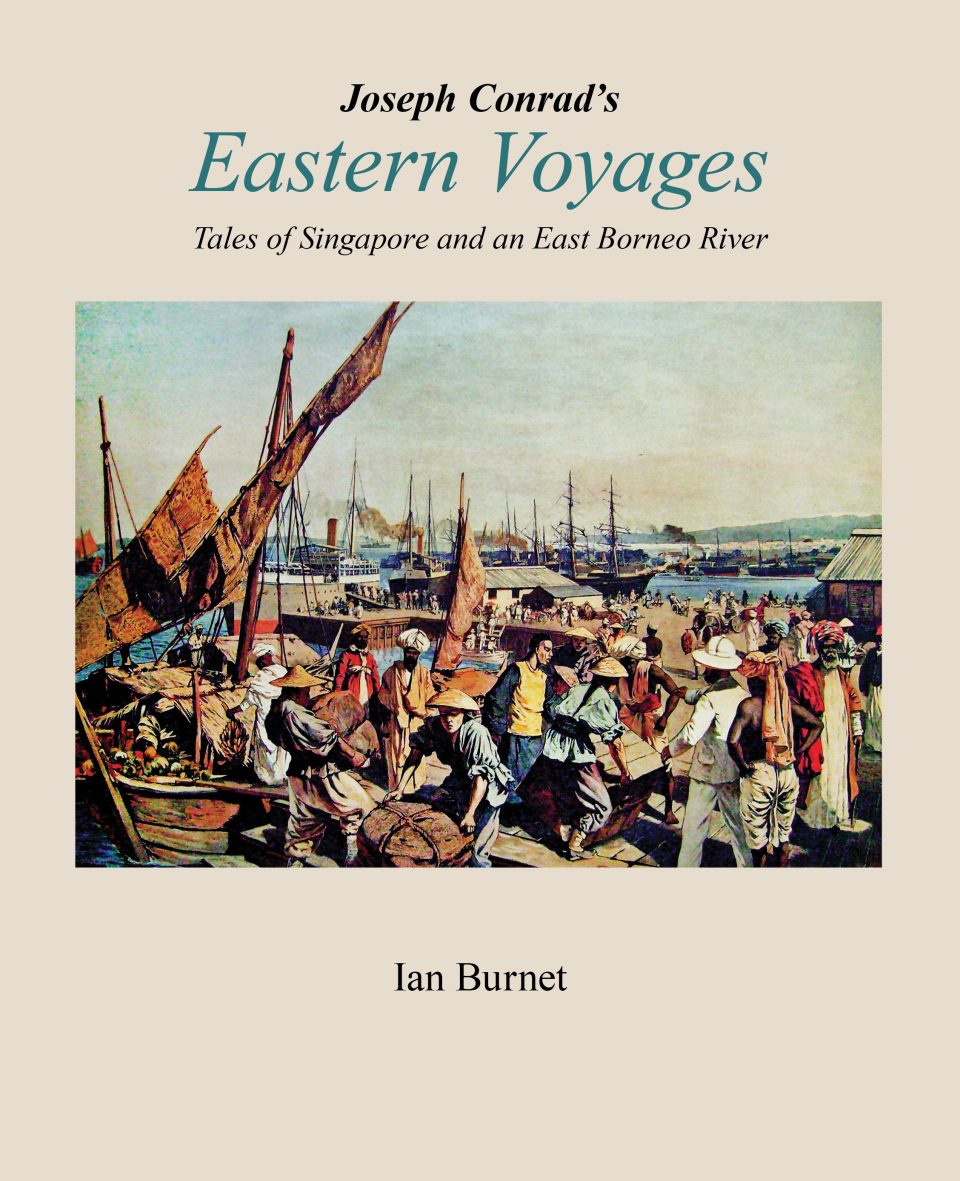The title caught my eye immediately: Joseph Conrad’s Eastern Voyages, Tales of Singapore and an East Borneo River.
The cover, with its image of sailing ships and steamships in Singapore, whet my appetite for a bookish journey back to some of my favourite haunts in Indonesia and Southeast Asia.
Ian Burnet’s latest offering follows a now-familiar pattern. His no-nonsense prose draws on thorough research and deep knowledge of Indonesia. But it is his first-hand experience of living, working, and travelling in the Indonesian archipelago that brings the narrative to life. A natural storyteller, Burnet writes with a personal touch, as if he is giving a talk on one of his guided trips to Eastern Indonesia. The stories, the cultures, and characters of the region are introduced through anecdotes, vignettes, and pen portraits which illustrate the broader sweep of history.
Burnet’s first six books explore the history of European exploration and colonization of the region (Spice Islands, East Indies), and its cultures and geography (Archipelago, Where Australia Collides with Asia, The Tasman Map). The new book looks deep into the late colonial era through the lens of Joseph Conrad’s novels. This is a clever device, enabling Burnet to celebrate the novelist and his works, while at the same time exploring this remarkable region in its heyday of travel and commerce at the end of the nineteenth century. It is a universal yet personal tale, told through the intimate stories of individuals, their ambitions and shifting alliances, their loves and hates, and ultimately flawed humanity set against the muddy rivers, the open oceans and the bustling seaports of the time. And all of this resonates with contemporary Southeast Asia. Somehow the characters seem just as real and relevant today as a hundred years ago.
Born to Polish parents in Eastern Europe in 1857, Josef Teodor Konrad Korzenioswki, reinvented himself as Joseph Conrad and joined the British Merchant Marine in 1878, becoming a British citizen in 1886. After a series of voyages to Singapore, Sydney, and various ports in what is now Indonesia and Southeast Asia, Conrad received his first and only command, as Captain of the Otago in 1888.
This was the high period of tall ships, when three-masted clippers and windjammers crisscrossed the globe, carrying goods back and forth from Europe to the new worlds of Southeast Asia and shiploads of emigrants to the colonies in the south. But, as Burnet’s book describes, the sail was already giving way to steam. The tall ships jostled for position in crowded eastern ports with sampans, junks, bumboats, Bugis schooners, and the new steel steamers with their smokestacks, oil slicks, and plumes of coal smoke smudging tropical skies.
Conrad’s career as a writer began in 1889. Over the next thirty years, he published fourteen books and he is recognised as one of Britain’s greatest novelists. The barque he commanded, the Otago, now lies forgotten in shallow water on the shores of the Derwent River, where I live in Tasmania, her rusting spine a sad memorial to the great age of sail. But Conrad’s books remain to tell the story of that remarkable period.
In An Outcast of the Islands, Conrad laments the passing of the age of sail.
Like a beautiful and unscrupulous woman, the sea of the past was glorious in its smiles, irresistible in its anger, capricious, enticing, illogical, irresponsible; a thing to love, a thing to fear. It cast a spell, it gave joy, it lulled gently into boundless faith; then with quick and causeless anger, it killed. But its cruelty was redeemed by the charm of its inscrutable mystery, by the immensity of its promise, by the supreme witchery of its possible favour. Strong men with childlike hearts were faithful to it, were content to live by its grace—to die by its will….
Then a great pall of smoke sent out by countless steam-boats was spread over the restless mirror of the Infinite. The hand of the engineer tore down the veil of the terrible beauty in order that greedy and faithless landlubbers might pocket dividends. The mystery was destroyed. Like all mysteries, it lived only in the hearts of its worshippers. The hearts changed; the men changed. The once loving and devoted servants went out armed with fire and iron, and conquering the fear of their own hearts became a calculating crowd of cold and exacting masters. The sea of the past was an incomparably beautiful mistress, with an inscrutable face, with cruel and promising eyes. The sea of to-day is a used-up drudge, wrinkled and defaced by the churned-up wakes of brutal propellers, robbed of the enslaving charm of its vastness, stripped of its beauty, of its mystery and of its promise.
I have always harboured a love of the sea, a willing victim to the romance of sail. Growing up in the remote harbour town of Hobart, how could one not grow to love the sea and her many moods? Living and working for thirty years in Jakarta, Singapore, Makassar, and Kalimantan on the east coast of Borneo, has deepened that love. It is the sea and the vessels who sailed upon her that connect us all, historically linking my hometown of Hobart to the great ports of Southeast Asia and the remote jungle rivers of Borneo. So, Conrad’s fictionalised experiences in Singapore, Kalimantan, and Southeast Asia have long intrigued me – and Burnet’s book resonates.
The vibrant bustling jumble of cultures, and the mercantile seafaring world that Conrad conjures up provide a seductive setting for the personal narratives of his novels. In Joseph Conrad’s Eastern Voyages, Tales of Singapore and An East Borneo River, Ian Burnet takes the reader back to that time at the tail end of the 19th Century, when adventurers and opportunists from the various European nations rubbed shoulders, struggling to gain a commercial edge over the Chinese, the Arabs, and coastal Malays who traded with the indigenous upriver Dayaks of Borneo. Burnet’s book brings that world back, enlisting Conrad’s prose from Youth to recreate that first taste of Asia that many of us from the “West” have felt.
Suddenly a puff of wind, a puff faint and tepid and laden with strange odours of blossoms, of aromatic wood, comes out of the still night – the first sigh of the East in my face … It was impalpable and enslaving, like a charm, like a whispered promise of mysterious delight.
Burnet’s book follows Joseph Conrad from his early life through to his seafaring years and his eventual retirement to England. He takes us through Conrad’s novels, and the various characters that inhabit them, the books ordered according to the sequence of events they depict from the novelist’s life experience, rather than the year each was published. The text is sprinkled with illustrations from the period, which help to establish the context.
Ian Burnet has captured something of Conrad’s world and something of his own love of Indonesia and the region in Joseph Conrad’s Eastern Voyages. It is a great summer read, and, for me, an enticement – as if I needed one – to escape the confines of my covid exile and return to the islands; to once again taste the sigh of the East in my face. Joseph Conrad’s Eastern Voyages was published in June 2021 by Alfred Street Press. If copies are not yet available in Periplus bookstores, then they can be ordered through the usual online retailers.
Mark Heyward
Mark Heyward is an Australian educator who has worked for over 30 years in Indonesia. He has published numerous articles for magazines and national papers in Indonesia and Australia on education, culture, literature, travel and the arts. His book, Crazy Little Heaven, an Indonesian Journey, is now in its second edition in both English and Indonesian.




